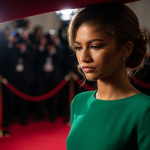Noel Clarke’s Libel Battle Against The Guardian Ends in Defeat: Actor Loses High-Profile Case

The Verdict is In: Clarke’s Bid to Reclaim Reputation Stumbles
In a significant blow to the actor and filmmaker Noel Clarke, the High Court has ruled against him in his libel case concerning allegations published by The Guardian newspaper. The verdict, delivered following a protracted legal battle, marks a decisive moment in a controversy that has shadowed Clarke’s prominent career in the British entertainment industry. The Guardian’s reporting, which detailed accusations of misconduct from multiple women, has largely been vindicated by the court’s decision.
The case revolved around a series of articles published by The Guardian in July 2021, which brought forward serious allegations from twenty women who had worked with Clarke. These claims included accusations of sexual harassment, unwanted touching, bullying, and verbal abuse over a period spanning more than a decade. Clarke vehemently denied all allegations, framing the reporting as defamatory and damaging to his professional standing and personal life. He initiated legal proceedings seeking substantial damages, arguing that the articles had caused irreparable harm to his reputation and his ability to secure future work.
The legal proceedings themselves were closely watched, not only for their implications for Clarke but also for the broader discourse surrounding accusations of misconduct in the media and the entertainment industry. Clarke’s legal team contended that The Guardian had failed to adequately investigate the claims, had acted maliciously, and had presented a biased and inaccurate account of events. They argued that the newspaper had a duty to verify the information rigorously before publishing such damaging allegations and that their failure to do so constituted libel.
However, the judge, Mr. Justice Johnson, found that The Guardian had established a defense of justification, meaning they had proven the truth of the core allegations made against Clarke. This pivotal finding means that the newspaper’s reporting, while undoubtedly damaging to Clarke, was protected by law because the allegations were substantially true. The court’s detailed judgment is expected to shed further light on the specific evidence and reasoning that led to this conclusion, but the immediate impact is a clear defeat for Clarke’s legal challenge.
A Decade of Allegations and a High-Stakes Legal Duel
The allegations that formed the basis of The Guardian’s reporting emerged in the wake of the #MeToo movement, a period of increased scrutiny and accountability for powerful figures in various industries. Clarke, a BAFTA-winning actor known for his roles in “Kidulthood,” “Adulthood,” and the BBC series “Doctor Who,” as well as his directorial work, found himself at the center of a storm as numerous women came forward with their stories. These accounts, detailed in The Guardian’s investigation, painted a picture of a pattern of behavior that many found disturbing and unacceptable.

Clarke’s initial response was to categorically deny the accusations, issuing strong statements through his representatives. He sought to discredit the accusers and the newspaper, asserting that the reporting was motivated by ill intent and a desire to damage his career. His legal strategy focused on demonstrating that the allegations were false and that The Guardian had acted with malice, a high bar to clear in libel law. The burden of proof, in this instance, effectively rested on The Guardian to demonstrate the truth of the allegations they published.
The trial involved extensive evidence, including witness testimonies from individuals who worked with Clarke, as well as cross-examination of Clarke himself and representatives from The Guardian. The court had to meticulously assess the credibility of the accusers and the robustness of the newspaper’s journalistic practices. The legal arguments were complex, delving into the nuances of libel law, journalistic privilege, and the standards of proof required to justify such serious allegations.
The stakes for both parties were incredibly high. For Clarke, a victory would have meant a formal repudiation of the allegations, potentially allowing him to rebuild his career and reputation. For The Guardian, a loss would have represented a significant setback for investigative journalism and the right to report on serious allegations of misconduct. The newspaper had robustly defended its reporting, emphasizing its commitment to giving a voice to those who had come forward and its thoroughness in investigating the claims.
The Impact on Clarke’s Career and the Broader #MeToo Landscape
The fallout from the initial Guardian report was immediate and severe for Noel Clarke. Sky, the broadcaster of his popular series “Bulletproof,” suspended production and announced it would not be broadcasting future series. Other professional relationships and opportunities also reportedly evaporated following the publication of the allegations. Clarke maintained that these consequences were a direct result of the defamatory reporting and sought to have them addressed through the libel proceedings.

This libel case was, therefore, not just about financial damages; it was about the ability of an individual to clear their name in the face of widespread accusations. Clarke’s supporters argued that the allegations were unsubstantiated and that he was a victim of a media frenzy and a rush to judgment. His legal team likely focused on highlighting any inconsistencies in the accusers’ accounts or any perceived failures in The Guardian’s editorial process.
However, the court’s decision to uphold The Guardian’s defense of justification suggests that the evidence presented was sufficient to convince the judge that the core of the allegations were true. This outcome aligns with the broader societal shift towards believing and supporting accusers in cases of sexual misconduct, a shift amplified by the #MeToo movement. It also underscores the legal protections afforded to media organizations that conduct thorough and responsible investigations into such matters.
The broader implications of this verdict extend beyond Noel Clarke. It provides a legal precedent and a clear indication of the judicial system’s stance on allegations of misconduct when reported by reputable media outlets. For individuals who have experienced similar situations, this ruling might offer a sense of validation, while for those accused, it highlights the critical importance of facing allegations with transparency and accountability. The ability for a newspaper to successfully defend its reporting on such sensitive issues, based on the truth of the allegations, can empower journalists to continue holding powerful individuals to account.
The Guardian’s Defense: Justification and Public Interest
The Guardian’s legal team would have meticulously prepared their defense, aiming to demonstrate that their reporting was not only factually accurate but also in the public interest. This involves proving the truth of the defamatory statements through a preponderance of evidence. In cases involving multiple accusers, as in this instance, the newspaper would have likely presented a cohesive narrative supported by corroborating evidence, witness testimonies, and a clear chronological account of the alleged events.

Key to their defense would have been the “justification” defense, which requires proving that the statements made were true. This is often the most challenging defense to mount in libel cases. The Guardian would have needed to present compelling evidence for each of the alleged instances of misconduct. This could include direct testimony from the accusers, any contemporaneous records, such as emails or texts, and potentially testimony from other individuals who may have witnessed or been aware of the alleged behaviors.
Furthermore, The Guardian would also have likely argued that the reporting was in the public interest. Given Clarke’s prominent position in the British media landscape, allegations of abuse of power and misconduct against him are widely considered matters of legitimate public concern. The public has an interest in knowing about the conduct of individuals who hold influential positions and shape cultural narratives.
The extensive nature of the allegations, involving multiple women over a significant period, would have been crucial in establishing a pattern of behavior, which often strengthens the defense of justification. The newspaper’s investigative journalists would have been rigorously cross-examined on their methodology, their efforts to verify information, and any potential biases. The judge’s ruling that the defense of justification was established signifies that these efforts were deemed sufficient and that the truth of the published allegations was proven to the court’s satisfaction.
Clarke’s Future: Navigating a Reputational Crisis Post-Verdict
For Noel Clarke, the High Court’s decision represents a significant setback, both legally and personally. The dismissal of his libel claim means that the serious allegations published by The Guardian will stand, at least in the eyes of the law. This outcome will undoubtedly have a lasting impact on his career and his public image. Rebuilding trust and professional opportunities after such a judgment will be an arduous task.

Clarke’s legal team may consider an appeal, but the success of such an endeavor would depend on identifying specific legal errors in the original judgment rather than simply disagreeing with the factual findings. The High Court’s decision on the justification defense suggests that the factual evidence presented was robust.
The verdict also serves as a stark reminder of the power of investigative journalism and the legal framework that protects it when conducted responsibly. The Guardian’s victory underscores the importance of media outlets holding powerful individuals accountable for their actions. It reinforces the idea that while reputations can be damaged by allegations, the truth, when proven, is a potent defense.
In the wake of this ruling, the conversation around accountability, consent, and workplace conduct in the entertainment industry will undoubtedly continue. Noel Clarke’s case has been a highly publicized example of these complex issues playing out in the legal arena. His defeat in this libel case will likely be analyzed and discussed for some time, offering insights into the challenges of seeking justice for alleged misconduct and the legal ramifications of reporting on such sensitive matters. The future of Clarke’s career remains uncertain, but this legal judgment undoubtedly marks a pivotal, and for him, deeply disappointing, chapter in his professional life.















